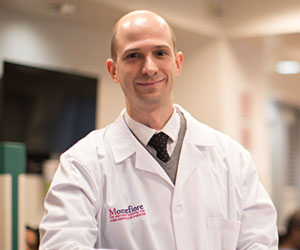

Transitioning Home
Transitioning Home: Montefiore Clinic Combats Health Disparities Affecting Former Inmates
Chronic health conditions such as substance-use disorders, mental illness and infectious diseases occur at higher rates among men and women in prison, and these health conditions may go untreated during incarceration, noted Dr. Aaron Fox, associate professor of internal medicine and of family and social medicine at Einstein and director of Montefiore’s Bronx Transitions Clinic (BTC). Following release, former inmates may find that long waits for doctors, high costs of care and stigma in medical settings can further prevent them from getting necessary treatment.

Aaron Fox, M.D.Now, in its seventh year of operation, the BTC has provided care for more than 500 Bronx residents. Its staff members work at the nexus of community health and the criminal justice system, where they seek to address health disparities.
“We recognize that individuals released from prison have unique needs and barriers to care, so we aim to provide coordinated, non-discriminatory, trauma-informed and patient-centered care, regardless of ability to pay,” explained Dr. Fox.
In October, Dr. Fox accepted the Joan H. Tisch Community Health Prize on behalf of the clinic. The award recognizes an individual or a nonprofit organization in the New York metropolitan area for outstanding accomplishment in the field of urban public health. One of three prize recipients, the BTC was chosen for its innovative, culturally competent program that serves as a model for awareness, care and advocacy.
Addressing a Community Need
Residents in Montefiore’s Residency Program in Social Medicine were inspired to establish the clinic after discovering that their patients were often involved with the criminal justice system; in a 2008 study conducted at Montefiore community health centers, more than 50 percent of respondents reported that they or a family member had spent time in jail or prison. The BTC model, which is part of a national transitions clinic network, is comprehensive in its approach. It links former inmates with primary care immediately after their release, assists them in accessing social services and encourages their follow-through with medical care by providing reminders and transportation to appointments.
By participating in BTC clinical care, Montefiore social medicine residents learn the common healthcare needs of former inmates, gain cultural sensitivity and learn to intake patients in a welcoming way that is free from stigma and judgment.
A Learning Opportunity for Medical Students

Medical student Adam ChamberlainThough Montefiore residents staff the BTC, in recent years Einstein medical students have had a growing role in assisting with research. Currently, three Einstein students—Adam Chamberlain, Brian Hagan and Daniel Riggins—are each conducting research with Dr. Fox, on relapse to substance use following release, post-traumatic stress disorder symptoms after exposure to solitary confinement, and opioid use disorder treatment, respectively. The students also observe patient care.
“The research contextualizes what they see in the office, will affect care that they give in the future and hopefully cultivates an interest in this kind of work,” said Dr. Fox.
Mr. Chamberlain agreed, noting, “Environmental factors such as poverty and poor nutrition have a significant impact on the health of Bronx residents, and the BTC directly addresses a lot of these social determinants of health. In the BTC, an essential component of patient care is asking people about how the criminal justice system has affected their life and their health. The issue of mass incarceration is rarely addressed in clinical spaces, so this was a unique opportunity for me to learn more about its effects.”
Expanding Student Involvement
The BTC will soon expand student exposure to the clinic through the community-based service learning project Space in Prison for Health Education for ReEntry (SPHERE). Through participation in SPHERE, students currently provide health education at the Edgecombe Correctional Facility, in Manhattan. In the future, they also will have the opportunity to observe patient care at the BTC.
As with the residents who work in the clinic, Dr. Fox has high aspirations for students who meet prison inmates, learn about health problems related to incarceration and participate in clinical care for former inmates and gain fuller picture of these patients’ healthcare experiences.. “I hope they become leaders in the field as they gain an understanding of how social justice impacts clinical care,” he said.
Posted on: Friday, February 17, 2017


